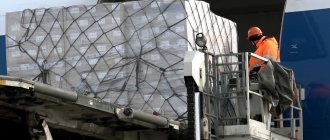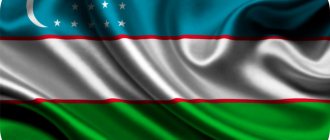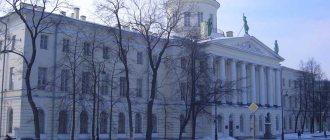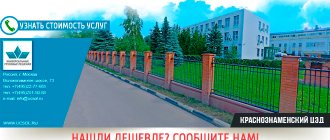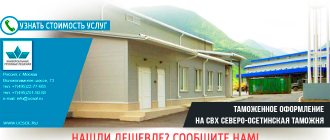Express analysis
96%
Company rating – high
+594 points for positive factors
-25 points for negative factors
Positive factors
- Long working time
The company was registered 11 years ago, which indicates stable activity and supervision by government agencies.
- Licenses available
The company has received a license, which is an indirect sign of the reliability of the counterparty.
- Participant in the public procurement system
The company is an official participant in the public procurement system under 44-FZ.
- Contracts as a customer
Signed several contracts under 94-FZ, 44-FZ or 223-FZ as a customer.
- Contracts as a performer
Signed several contracts under 94-FZ, 44-FZ or 223-FZ as a contractor (supplier of goods or services).
- Not included in the register of unscrupulous suppliers
According to the FAS, it is not included in the register of unscrupulous suppliers.
- No connections to disqualified persons
According to the Federal Tax Service, the company’s executive bodies do not include disqualified persons.
- There are no mass leaders and founders
Managers and founders are not included in the registers of mass leaders and mass founders of the Federal Tax Service.
Negative factors
- Debts in enforcement proceedings
According to the FSSP, there are debts from enforcement proceedings. Balance of outstanding debt: RUB 5,000. Information current as of December 14, 2021. There may be similarities in name and address, double-check the information on the official website of the FSPP.
Requisites
| OGRN | 1107746902251 |
| TIN | 7735573025 |
| checkpoint | 773501001 |
| Code KLADR | 770000020004537 |
| OPF code | 75104 (Federal government agencies) |
| OKTMO code | 45927000 |
| SDR code | 01731000149 |
| ICU | 17735573025773501001 |
See also information about registration of the MOSCOW REGIONAL CUSTOMS with the Federal Tax Service, Pension Fund of the Russian Federation and the Social Insurance Fund
Price
One consignment of goods is understood as a consignment of goods sent at a time to the consignee using one waybill in one vehicle within the framework of one foreign trade contract.
| Type of work | Cost without VAT) |
| Carrying out customs operations and declaring goods of one consignment in import mode (IM 40): - consulting; — checking the package of documents provided by the Customer for customs clearance of one consignment (including shipping documents); — formalization of delivery documents, preparation, filling out the declaration form and electronic submission to the customs authority. | from 5,000 rubles |
| Carrying out customs operations and declaration for each subsequent consignment in import mode, if there are several consignments in one vehicle (IM 40): - consulting; — checking the package of documents provided by the Customer for registration of one consignment (including shipping documents); — formalization of delivery documents, preparation, filling out the declaration form and electronic submission to the customs authority. | from 4,000 rubles |
| Registration of each additional sheet of goods declaration, starting from the 5th (fifth) product in the import mode (IM 40). | from 450 rubles |
| Carrying out customs operations and customs declaration of goods of one consignment in export mode (EC 10): - consulting; — checking the package of documents provided by the Customer for one consignment (including shipping documents); — formalization of delivery documents, preparation, filling out the declaration form and electronic submission to the customs authority. | from 3,000 rubles |
| Carrying out customs operations and declaring goods of one consignment (other modes): - consulting; — checking the package of documents provided by the Customer for customs clearance of one consignment (including shipping documents); — formalization of delivery documents, preparation, filling out the declaration form and electronic submission to the customs authority. | from 10,000 rubles |
| Payment (additional payment) of any types of customs duties under one DT on behalf and on behalf of the Customer, using the representative’s own funds through terminal payment using a customs card/online service of the ROUND payment system. | from 3% of the documented payment amount (additional payment), but not less than 1,000 rubles |
| Assistance in obtaining a Declaration of Conformity with the CU TR for goods, as well as other permitting documents. | discussed individually |
Contacts
| Address | 124498, Moscow, Zelenograd, Georgievsky Ave., 9 On the map |
| Phones | +7, |
| Fax | +7 |
| [email protected] сtu.customs.ru | |
| Web site | ctu.customs.ru |
| Is your contact information out of date? If you are related to the MOSCOW REGIONAL CUSTOMS and know the exact contact details of this company, please share them. Edit contacts | |
Customs risks
The most common problems faced by foreign trade participants during customs formalities:
- cost checks are the cause of temporary losses and unexpected financial costs (associated in most cases with an increase in storage costs);
- adjustment of the vehicle (and payments) - with the payment of security, “freezing” of funds for up to six months and a multi-step process to return them;
- incorrect classification of goods (there can be many reasons, from the unprofessionalism of the broker, incorrect interpretation of data and inattention to changes in the EAEU Commodity Nomenclature of Foreign Economic Activity to technical errors, lack of documents, lack of a class decision for the project cargo) - the result can be the selection of samples and specimens, significant costs and even administrative prosecution;
- protracted inspection - and again unpleasant storage costs, in addition to the inevitable ones (fees for terminal operations);
- identification of inconsistencies, errors and shortcomings in documents (and their completeness) after registration of DT is a common cause of delays, refusals to issue, and consequences of “varying degrees of severity”;
- non-compliance with import/export conditions, prohibitions and restrictions - the problem may arise as a result of incorrect classification, “omissions” on the part of the representative’s own specialists or employees - entails very serious customs and administrative problems;
- inconsistency in the actions of the contractor during mandatory border control can lead to loss of time, money and much more serious difficulties;
- technical errors when filling out a declaration are a frequent “reason” for refusal to issue and additional checks;
- lack of funds transferred by the declarant to the Federal Customs Service for release (for example, they forgot to pay on time, an adjustment or security was assigned) is another reason for delays;
- failure to timely inform the declarant (and the supplier, as a consequence) of the need to provide additional documents that would allow the reasonable application of preferential rates of duties and taxation - payment of duties and taxes in full in cases where this can be avoided;
- Ignoring the nuances and features of a particular post in the conditions of Russian reality often results in additional checks “out of the blue”;
- In many cases, additional checks are caused by the broker’s “exit” to a new post or customs office.
Types of economic activities
Main activity
| 84.11.4 | Financial and tax management |
Licenses
1. License No. 77.99.15.002.L.000082.06.11 dated June 1, 2011
Kind of activity
Activities in the field of use of ionizing radiation sources (generating) (except for the case if these sources are used in medical activities)
Licensing authority
Federal Service for Supervision of Consumer Rights Protection and Human Welfare
Operating procedure
- Request. You leave a request in any convenient way: by phone, email or through forms on the website.
- Consultation with a specialist. We call you back and find out your task in the field of foreign economic activity and inform you of the price for customs clearance.
- Signing the contract. Agreeing on the terms of cooperation and signing the contract.
- Preparation of documents and certificates. Collection and preparation of the necessary permits for the import or export of your goods.
- Customs clearance. Submitting a declaration, resolving disputes and attending inspections and inspections.
International cargo transportation in Sergiev Posad
provides international class services: with our help you can deliver goods to Sergiev Posad, the region and any country in the world.
We deliver by the following types of transport:
- automobile;
- railway;
- container;
- air;
- combined (multimodal).
Working with cargo is possible regardless of the size and type of goods. Transportation is carried out exclusively by professionals. Any cargo can be delivered both to and from Sergiev Posad, including:
- perishable;
- oversized;
- heavy;
- bulk;
- dangerous;
- liquid;
- prefabricated, etc.
Temporary storage warehouses in Sergiev Posad
Unfortunately, today there are no operating temporary storage warehouses in the Sergiev Posad district of the Moscow region.
Branches of the customs broker KVT provide services for customs clearance of goods in the following regions: Moscow and the Moscow region, Smolensk region, Krasnodar region, St. Petersburg.
Customs broker KVT offers its qualified assistance to legal entities in customs clearance of goods. At your service is an experienced customs broker, your representative and intermediary, whose activities are licensed.
In our power:
- customs clearance of goods supplied from abroad;
- customs clearance of export cargo;
- customs clearance of goods imported within the framework of classification decisions.
We work with legal entities and individual entrepreneurs.
We will clear customs or customs your cargo, organize loading, unloading, placement in warehouses, arrange insurance and much more!
Customs broker KVT provides the following types of services:
- Customs clearance of goods;
- Proof of customs value;
- Customs clearance of goods;
- Outsourcing of foreign trade activities;
- Consultations on foreign trade activities;
- Customs clearance of imports;
- Customs clearance of export;
- Classification decision of the Federal Customs Service.
Advantages of working with us:
- Customs representative license;
- Customs clearance same day;
- Own temporary storage warehouse in Sheremetyevo;
- Optimal routes.
Customs broker services
- Personal customs clearance specialist;
- We prepare and execute the necessary documentation - declarations, applications, various permitting forms, documents, reporting;
- Recommendations on HS codes for goods;
- Preliminary calculation of customs value and amount of advance customs payments;
- Drawing up DT projects and related documents;
- Document flow with customs;
- Submission of information at the request of Moscow Customs;
- Representation of the Customer's interests in the customs authorities of the Russian Federation;
- Organization, if necessary, of preliminary customs inspection of goods and vehicles before submitting the DT;
- Drawing up a declaration of intent under the seal of the customs representative;
- Consulting in the field of foreign economic activity (FEA);
Customs services at the Moskovsky shipping point (CED)
Businessmen usually seek the services of a customs broker, who will take full responsibility for customs clearance. After completing all the procedures, the foreign trade participant receives customs cleared cargo and documents.
A customs broker at the Moscow customs post will draw up all the necessary documents for the goods, check the literacy of the documentation prepared by the client, prepare a customs declaration, set the product code according to the Commodity Nomenclature of Foreign Economic Activity and other actions necessary to release the cargo from the customs post.
The cost of customs clearance depends on the characteristics of the cargo and is set individually for each participant in foreign trade activities. The customs clearance process must be approached very responsibly, because even the slightest mistake can lead to confiscation of cargo, delay of goods at customs and, as a result, unexpected costs of temporary storage facilities for cargo demurrage, etc.
Documents for registration at the Moscow customs post
Documents WE require:
For legal entities:
- Charter and amendments to it;
- The decision to create a company or the Memorandum of Association;
- Extract from the Unified State Register of Legal Entities;
- TIN;
- Order on the appointment of a director.
For individual entrepreneurs:
- Passport;
- TIN;
- Entry sheet in the Unified State Register of Legal Entities.
WE WILL NOT REQUIRE OTHER DOCUMENTS!
Documents that other Moscow brokers require to register a foreign trade participant with customs:
- application for registration of participants in foreign economic activity;
- the organization's charter and constituent agreement;
- minutes of the meeting of founders (in case of changes in the authorized capital);
- certificate of registration with the tax authorities indicating the TIN and KPP;
- extract from the Unified State Register of Legal Entities;
- an extract from the State Statistics Committee indicating OKATO codes (not older than six months);
- a certificate from the bank confirming the opening of accounts (ruble and foreign currency), no older than one month;
- buh. balance sheet for the last tax period with a tax mark;
- an agreement that confirms the location of the organization (for example, a lease agreement);
- orders for the appointment of general director and chief accountant;
- passports of the chief accountant and general. directors;
- certificate from the currency control department.
Moscow regional customs - course towards digitalization
The material was prepared by the editors of the magazine “Regions of Russia: National Priorities”
The customs service is one of the most important institutions of any state. At the same time, customs is a unique structure that connects the interests of the state and society. For the state, customs is a reliable source of replenishing budget revenues, a mechanism for promoting the development of trade; for the population, it is, first of all, a guarantor of the safety and quality of foreign products entering the country. In Russia, the largest customs authority both in terms of trade turnover and the number of goods released is the Moscow Regional Customs, which this year celebrates the tenth anniversary of its existence.
Currently, the Federal Customs Service, in accordance with the Government-approved Strategy for the Development of the Customs Service of the Russian Federation, is carrying out a large-scale reform of the entire customs administration process, which must be completely transferred to digital technologies. The comprehensive development program of the Federal Customs Service of Russia for the period until 2021 provides for the creation of 9 electronic customs offices and 16 electronic declaration centers. We will show how this process works in practice using the example of the Moscow Regional Customs, which marked its tenth anniversary with a transition to a new format of work.
The Moscow Regional Customs, established on October 5, 2010, is one of the largest in Russia both in terms of trade turnover and the number of declarations processed. The region of customs activity includes the Moscow region and the federal city of Moscow. Its structure includes 22 customs posts, including a specialized customs post serving the Dubna special economic zone of technology-innovation type. In the region where customs operates, there are 43 temporary storage warehouses, 11 customs warehouses, 18 temporary customs control zones, 28 authorized economic operators and almost 22 thousand participants in foreign economic activity.
Last year, as part of a large-scale reform of the structure of customs authorities carried out by the Federal Customs Service, the largest electronic declaration center not only in the Central region, but throughout the Russian Federation was launched on the basis of the Moscow Regional Customs. The process, which was launched on January 29, 2019, clearly demonstrates the dynamics of the development of reforms in the department. The gradual process of automation of customs operations through the introduction of information technologies into the activities of customs authorities and participants in foreign trade activities, which is now commonly called digitalization, has become a prerequisite for the transition to innovative principles for the development of the customs service as an integral part of government bodies. A large-scale transition to information technology consists not only in speeding up operations and reducing various costs, but also in reforming the customs authorities themselves, fundamentally changing approaches to management and functions performed.
When creating the Moscow Regional Center for Electronic Declaration, customs officers adhered to the principle of gradual (in three stages) concentration of the declaration array in it, which was previously processed at 36 customs posts. The process was completed only on March 1, 2021, and the processing of all export-import declarations submitted in the region of operation of the Moscow Regional Customs was finally transferred to the Electronic Declaration Center. Goods subject to other customs procedures (processing, transit, etc.) still remain within the competence of the remaining customs posts of the Moscow Regional Customs after the reduction, which received the status of customs posts of actual control. But from July 1 of this year, the clearance of goods for all customs procedures is also planned to be transferred to the Electronic Declaration Center, after which the customs posts of actual control will only carry out the acceptance of goods and their customs control.
We have already noted the colossal volume of cargo released by the Moscow Regional Customs. Judge for yourself, last year customs issued over 620 thousand declarations for goods, on average more than 1,600 declarations daily. Over 6 million tons of goods worth more than 54 billion US dollars were processed, more than 616 billion rubles were transferred to the federal budget (9.2% more than in 2018).
It should be noted that the Moscow Regional Customs is unique - the region of its activity exceeds the territory of Switzerland (48,890.5 sq. km versus 45,227 sq. km), and the number of inhabitants is greater than the population of a state such as Romania (19,804,134 people versus 19,401,658). Accordingly, the Moscow Regional Center for Electronic Declaration, being the largest in the country in terms of number and importance, processes about 10% of all declarations in the country and over 10% of customs payments transferred to the federal budget also fall on it. Its workload is much higher than that of other customs authorities: on weekdays, more than 3 thousand declarations are submitted per day, and among import declarations for goods there is a high proportion of complex, multi-commodity declarations, including 300-400 items. If we add to this that the majority of the most active and largest participants in foreign trade activities are concentrated in Moscow (more than 20 thousand companies register at the Moscow Regional Customs), the scale of the task set by the leadership of the Federal Customs Service becomes clear - to transfer the Moscow Regional Customs completely to digital technologies. These objective reasons largely determine the difficulties that arose at the initial stage of the work of the Electronic Declaration Center. And it is clear that such a large-scale, quite revolutionary process was not without its rough edges. Foreign trade participants complained about delays in the release of goods.
The Federal Customs Service immediately got involved in resolving these issues: the head of the Federal Customs Service of Russia, Vladimir Bulavin , has repeatedly emphasized that the Electronic Declaration Center of the Moscow Regional Customs is under the close attention of management.
First Deputy Head of the Federal Customs Service Ruslan Davydov
First Deputy Head of the Federal Customs Service Ruslan Davydov immediately held a meeting with business representatives, during which he emphasized that the created Electronic Declaration Center meets the most modern requirements and criteria. It will employ over 300 employees - such facilities have never existed in the history of the Federal Customs Service. Therefore, due to the increase in load, it is important to ensure uninterrupted operation of the “electronic declaration factory”. Ruslan Davydov focused on the fact that one of the main tasks when implementing the system of Electronic Declaration Centers is to break the connection between the declarant and the issuing inspector, minimizing the risk of a corruption component.
Chairman of the Public Council Leonid Lozbenko
The Public Council under the Federal Customs Service of Russia did not stand aside either. At the initiative of the Chairman of the Public Council, Leonid Lozbenko , a series of “round tables” were held, at which the problems of participants in foreign trade activities processed at the Moscow Regional Customs were discussed. According to Leonid Lozbenko, the situation could only be rectified through the joint efforts of customs officers and business.
It should be recognized that the measures taken made it possible to establish work in a new format.
Head of the Moscow Regional Customs Vyacheslav Romanovsky
As Vyacheslav Romanovsky , head of the Moscow Regional Customs, noted, “complaints from business still remain, but they are already isolated.” Currently, the Moscow Regional Customs is working to increase the share of automatically registered and automatically issued declarations. “Expanding the practice of automating operations would free up a sufficient number of customs inspectors at registration and at release,” noted Vyacheslav Romanovsky. “On the scale of our Electronic Declaration Center, this is a significant indicator.”
Indeed, the process of introducing automatic technologies is underway: at the end of 2021, the share of automatically registered export declarations for goods increased from 33.3% to 87%, import declarations - 15.8% to 45%, the share of automatically issued ones at the end of the year was 45.4% and 29.3 respectively. However, customs management believes that these rates are not sufficient to completely eliminate delays in cargo clearance. The main obstacle here is the high percentage of errors made by participants in foreign trade activities when filling out declarations (if there is any, even the most insignificant error in the declaration of goods, registration is immediately transferred to manual mode, and the release time is accordingly delayed). According to an established tradition, all issues at the Moscow Regional Customs are discussed with the business community. Therefore, at the very beginning of this year, the Advisory Council at the Moscow Regional Customs met in order to quickly, through the joint efforts of both customs officers and foreign trade participants, seek solutions to emerging problems. And, of course, work will continue to select qualified specialists, for which interaction has been organized with the Russian Customs Academy and other universities in Moscow and the Moscow region. And this is understandable, because taking into account the changes taking place, the training of future specialists in the field of customs affairs, who adequately perceive what is happening, are able to navigate multitasking conditions and, in terms of their qualification indicators, meet the requirements of our time, is of great importance.
In addition, according to Ruslan Davydov, who took part in the meeting, due to the increase in load, it is important to technically ensure the uninterrupted operation of this “electronic declaration factory.” And for this, the Federal Customs Service will constantly improve the operation of information systems. For this purpose, the Main Data Processing Center is currently being built in Tver.
